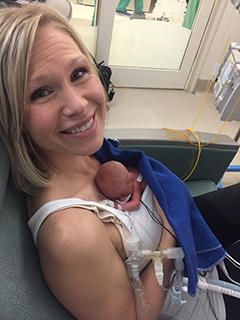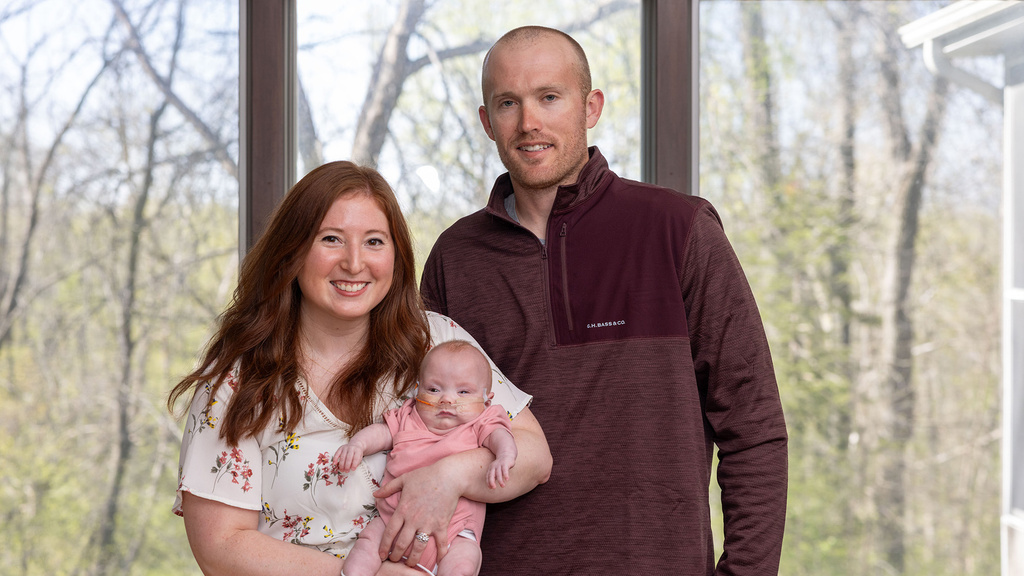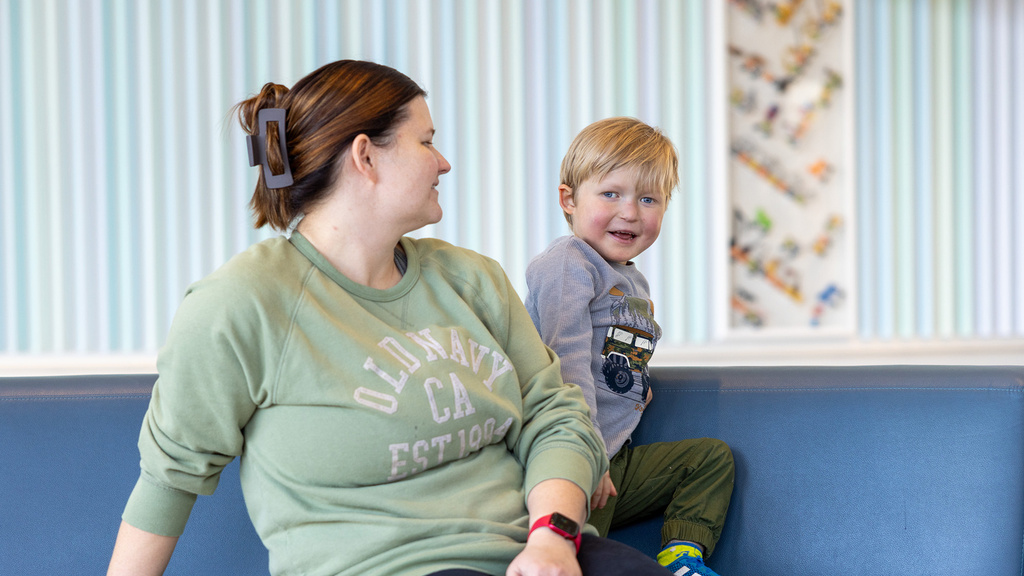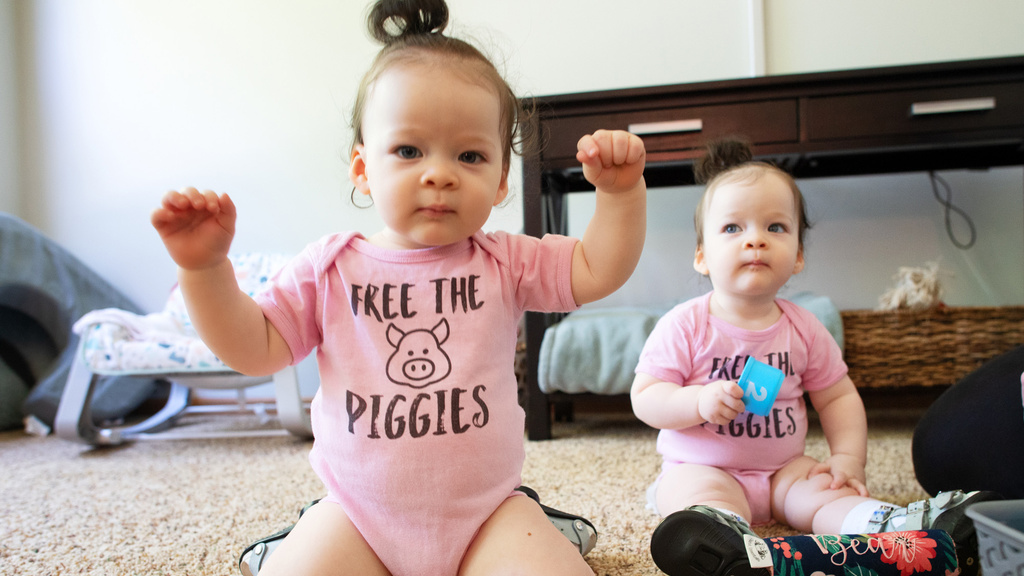Knox Tysdahl was born at 23 weeks gestation at Stead Family Children’s Hospital in 2017. UI Health Care’s large team of high-risk obstetricians, its Level 4 neonatal intensive care unit, and the attitude that every baby in its care will go on to live a healthy life helped ensure Knox would be another “micro preemie” success story.
Story: Molly Rossiter
Photography: Missie Lafrenz Photography
Published: Sept. 23, 2019
Carrie and Troy Tysdahl, of Clear Lake, Iowa, know the importance of being in the right place at the right time.
When the couple took their son, Knox, home from the Neonatal Intensive Care Unit (NICU) at University of Iowa Health Care Stead Family Children’s Hospital on July 5, a week after his due date, he weighed 9 pounds, 1 ounce — a healthy weight for a newborn.
But Knox wasn’t a newborn. He was a little more than 4 months old. The first 22 weeks of Carrie’s pregnancy had been completely normal — Knox was her third pregnancy and her first two boys were healthy, full-term babies — so she didn’t suspect a problem. Even when her water broke in the middle of the night, Carrie had no reason to suspect what had happened. She dismissed it as leakage and continued the next day as normal, going to the gym and then to work.
Concerned, friends and family convinced Carrie to see a doctor, and she and Troy went to the emergency room together after work, expecting to be told everything was fine.
Instead, doctors at their local hospital told Carrie her water had broken but because she had not reached 23 weeks’ gestation — a marker used by many hospitals in determining viability of a pregnancy — they gave her little hope that her baby would survive if she went into labor. Carrie was admitted to her local hospital so doctors could administer fluids, and the next day had to decide between going home, trying to maintain the pregnancy for another week before a Des Moines hospital would admit her, or call doctors at UI Health Care.
“We decided to ask them to call Iowa City,” Troy says.
“University of Iowa Stead Family Children’s Hospital is unique in terms of extreme premature survivor data. If we can save a life, we’re going to do it. The neonatologists let us know what their assessment is for the baby, and we’re not going to put mom at risk for no reason.”
Carrie and Troy consulted with Carrie’s obstetrician, who then called Stephen Hunter, MD, a high-risk obstetrician specializing in maternal-fetal medicine (MFM) with University of Iowa Health Care. Hunter told Carrie’s obstetrician to have her sent by ambulance to Iowa City immediately.
“University of Iowa Stead Family Children’s Hospital is unique in terms of extreme premature survivor data,” Hunter says. In fact, survival rates for babies born at 23, 24, and 25 weeks are significantly higher than survival rates for extremely premature babies born at other U.S. hospitals, placing UI Stead Family Children’s Hospital among the top neonatal intensive care providers anywhere.
A big part of that success, he said, is that maternal-fetal medicine specialists and neonatologists work as a team.
“If we can save a life, we’re going to do it,” Hunter says. “The neonatologists let us know what their assessment is for the baby, and we’re not going to put mom at risk for no reason.”
With eight doctors on staff, UI Health Care has the largest team of high-risk obstetricians in the state of Iowa.
“I think every pregnant woman has to be aware of what is going on in her pregnancy,” he says. “Moms need to know that if they feel something isn’t right, they need to have the courage to call a physician and tell them that.”
That’s when the collaboration between maternal-fetal medicine and neonatology really works.
“There’s a level of trust between the two specialties that let us have a successful program,” Hunter says.
Carrie and Troy experienced the partnership of the two areas of expertise right away.
“We went in one day from being at one hospital telling us they would let him pass away to coming to Iowa City and being told he had a 50-50 chance,” Carrie says.
Once the couple arrived in Iowa City on Feb. 23, Carrie was taken to labor and delivery. There, maternal-fetal medicine doctors and neonatologists could assess her condition and determine whether she was in danger of going into labor within the next 48 hours. She remained in the hospital under the careful supervision of the MFM team as they tried to delay the birth.
Knox was born at 23 weeks gestation, or 17 weeks early, on March 4, 2017. Carrie felt fine until she suddenly felt Knox’s feet coming out. She immediately called for assistance and was rushed to surgery. Only 14 minutes passed from when Carrie made the call for assistance to when Knox was delivered. He weighed 545 grams — or just 1 pound, 3 ounces — and was 11 inches long. Knox was considered a “micro preemie,” a term identifying those born before 26 weeks gestation and weighing less than 1 pound, 12 ounces.

“People put clichés on teaching hospitals, they say they’re impersonal, but that couldn’t be further from the truth. This place is incredibly special to us. These people are family.”
For many babies born so prematurely, their early days and weeks include dealing with complications that require multiple medications and even surgeries. “There are so many complications we worry about with extremely pre-term babies: bleeding in the brain; blood in the bowels; lung disease; heart problems, vision problems,” says Jeffrey Segar, MD, formerly of Stead Family Children’s Hospital, who was Knox’s primary neonatologist during his hospital stay.
Segar points to Knox’s success as an example of how UI Health Care is a leading hospital in the country caring for “micro preemies,” and why, unlike most hospitals, doctors won’t turn away women who are at 22 weeks gestation.
“We feel it’s very reasonable to try to resuscitate those babies who are born very early,” Segar says. “The difference between 22 weeks and 23 weeks is so minimal, and there are inaccuracies in gestational dating.”

Knox Tysdahl, center, now 2 years old, poses with his older brothers during a recent family photo session.
Children don’t mature at the same pace, and neither do babies in utero, he says.
“Babies grow at their own pace,” Segar says. “We don’t want to turn a baby away just because mom is only so far into gestation—we want to give the baby a chance at life.”
UI Stead Family Children’s Hospital is home to Iowa’s only Level 4 NICU—the highest level recognized by the American Academy of Pediatrics. Level 4 NICUs are equipped to care for the tiniest and most critically ill babies, offering the greatest range of neonatal services and support. In fact, doctors at UI Stead Family Children’s Hospital care for more complex conditions than any other NICU in Iowa. A team of pediatric experts, all trained in the specific needs of infants, work closely with neonatologists to care for infants medical and developmental progress. The team includes nurses, respiratory therapists, nutritionists, social workers, pharmacists, lab technicians, and physical therapists.
As part of Iowa’s only comprehensive children’s hospital, the NICU at UI Stead Family Children’s Hospital has immediate access to the expertise of every possible pediatric specialist 24 hours a day.
By delivering at UI Hospitals & Clinics, with the combined expertise of the maternal-fetal medicine and neonatal teams, Carrie was able to stay with Knox after he was born and admitted into the NICU. Families never have to be transferred to another hospital for more advanced care.
“It is our attitude that every baby that comes into our NICU is going to go on and live a healthy life,” Segar says. “That doesn’t always happen, but we always have that attitude, and we work with that goal in mind.”
National leaders in neonatology
Our survival rates for babies born at 22, 23, 24, and 25 weeks are signifcantly higher than survival rates for extremely premature babies born at other U.S. hospitals (averaged from 2006 to 2017).
59 %
76 %
86 %
89 %
“These people have changed us”
In the days before they were able to take Knox home, Carrie and Troy spent time learning how to handle his home oxygen delivery system and thanking his care team. There were occasional tears when they thought about leaving.
“We’re excited, this is what we prayed for,” Carrie says. “But these people have changed us, they are so special to us in so many ways.”
“People put clichés on teaching hospitals, they say they’re impersonal, but that couldn’t be further from the truth,” Carrie says. “This place is incredibly special to us. These people are family.”
Carrie and Troy were able to stay with Knox and had accommodations at the nearby Ronald McDonald House when their two older sons came to visit. Although they weren’t patients, Carrie said hospital staff went out of their way to care for the older boys, including providing surprise Easter baskets for them.
One member of their care team, Stacy Kern, MD, was with Carrie and Troy from the beginning and forged a relationship beyond that of doctor and patient.
“We all just felt we had a bond from the first moment they arrived,” says Kern, formerly of UI Stead Family Children’s Hospital. “We connected immediately. I happened to be the neonatology fellow on call when they came in, and I was on call when Knox was born. I ran to Carrie’s room as soon as I got that page.”
Troy says he was afraid for his wife and baby in those chaotic minutes, but that changed when Kern arrived.
“The look I got from Stacy at that moment calmed me down immediately,” he says. “I saw her and I knew she and God had it.”
Carrie and Troy felt so close to Stacy, in fact, that they named her Knox’s godmother.
“I’ve had the most incredible bond and journey with this family,” Kern says.
A top neonatal intensive care provider
University of Iowa Health Care Stead Family Children’s Hospital is home to a Level 4 NICU — the highest level recognized by the American Academy of Pediatrics. This means that our NICU is equipped to care for the tiniest and most critically ill babies, offering the greatest range of neonatal services and support. In fact, we care for more complex conditions than any other NICU in Iowa.
Our survival rates for babies born at 22, 23, 24, and 25 weeks are significantly higher than survival rates for extremely premature babies born at other U.S. hospitals, placing UI Stead Family Children’s Hospital among the top neonatal intensive care providers anywhere.



